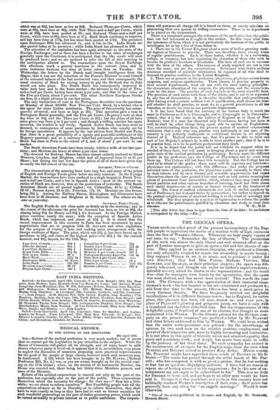MEDICAL REFORM.
TO THE EDITOR OF THE SPECTATOR.
8th April 1841.
SIR—Reform of the medical profession is very much needed; but it seems that we cannot get the Legislature to pay attention to the subject. While the House of Commons will gather all its strength, and sit many hours to split straws wherever party is involved, it appears that it is, nevertheless, very prone to neglect the discussion of measures proposing mere practical improvements for the good of the people or large classes, however much such measures may be desidemted. A bill, which has been brought in by Mr. HAWKS, (Medical Profession Bill, No. 2,) was, as you are aware, brought up for the second read- ing on the 17th ultimo; when, on the motion of an honourable Member, the House was counted oat, there being but thirty-three Members present, and none of the Ministry. Reform of the medical corporations is wanted not only on the part of the profession, but especially also on the part of the public. These corporations themselves admit the necessity for change ; for they say—" Stop but a little while; we are about to reform ourselves." But if confiding people wait till the corporations advance so far in liberality as to reform themselves, they shall have to wait exactly as long as they have had to wait on former occasions for Mich wonderful proceedings on the part of bodies possessing power, which could be turned as readily to private interest as to public usefulness. The corpora- , tions will postpone all change till it is forced on them, or merely calculate on protracting thew own system by trifling concessions. There is no dependene* to be placed on the corporations. There is a complaint amongst the reformers of the profession that the public does not feel interested as it ought in this matter. As this must arise from the ignorance of facts, which it is not particularly the business of the public to investigate, let us lay a few of them before it. 1. There are in the United Kingdom about a score of bodies granting medi- cal degrees or licences to practise. There are therefore, about twenty kinds of regular practitioners. Each of these bodies, whether it be a univeraitp, college, or company, has laws regulating the education of those who wish So become its graduate members or licentiates. The laws of each are at variance with the laws of the others. The courses of study required are not in twe cases the same ; nor are the examinations. Reformers wish that a uniforas minimum standard of scientific information be required of all who shall be licensed to practise medicine in the United Kingdom. 2. There are at present in the profession physicians, physician-acconcheums surgeons, and eurgeon.apothecaries. These classes, to practise properly in their several departments, must set out with the same leading principles: the elementary education of the surgeon, the physician, and the acconcheur, must be the same. The practice of each depends on the same scientific facto. The province of each mixes with those of the others, and is not to be separated by any line of demarcation. It is therefore desirable that each practitioneel after having stood a certain uniform test of qualification, shall choose for him, self whether he shall practise, as most do, as a general practitioner in all tn* branches, or devote his time to one particular department, 3. It has been found that the anatomy of the human body is much deo same in Caithness as it is in Connaught, and in Connaught as in Cornwall— indeed, that it is the same in the natives of England as in those of New Zealand; that if a man has dissected only Frenchmen, having but done it well, he shall be, other things being equal, able to operate on Englishmen. Yet, notwithstanding these facts, the present system of medical corporations maintains that a man who may practise very judiciously in one part of the country is yet perfectly inadequate to understand disease in an adjoining
i
district of t. Medical reformers say, that if a person is able to treat one part of her Majesty's subjects he is able to treat another part ; that if he lefit to practise here, so is he to perform professional duty there. It is to be hoped that the public will not withhold its support when re- minded of these facts, but will assist in bringing about a parer and more re4 gular state of the medical profession by petitioning. Society made the different grades in the profession, says the College of Physicians, and we must keep them up. The College will not leave this to society. But the College has-no need to be afraid of the grades : there must still be superiors and inferiom- physicians and apothecaries; with this difference, that under the proposed amended state of the profession, the physicians would naturally be those who by their talents and by their literary and scientific acquirements had raised themselves above the more general level—not such as hold certain meaningless pieces of parchment from universities, which, whatever they may teach about Greek particles and other curious branches of learning, know but little abase such useful departments of science as human anatomy or the treatment et disease. The wisest of medical reformers do not seek to abolish quackery by act of Parliament, lest it should thrive by persecution; but rather to depend ms . the gradual enlightenment of mankind sending it to the tomb of astrology and witchcraft. But they propose by a system of registration to inform the publie as to who are the practitioners qualified by education and study to treat their diseases. W. B., M.D. [This able letter has been in type from the time of its date : its usefuhiese is unimpaired by the delay.—En.]


























 Previous page
Previous page